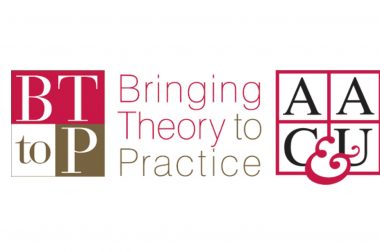The initiative led by the Bringing Theory to Practice project is supported by an $800,000 grant from The Andrew W. Mellon Foundation to the Association of American Colleges and Universities.
Elon University has been selected to participate in a collaborative, community-based humanities and civic engagement initiative launched by the Bringing Theory to Practice project.
 A multi-campus collaborative initiative (a “collaboratory”), Partnerships for Listening and Action by Communities and Educators (PLACE) is supported by a two-year, $800,000 grant from The Andrew W. Mellon Foundation to the Association of American Colleges and Universities (AAC&U), which serves as the host and partner to Bringing Theory to Practice (BTtoP).
A multi-campus collaborative initiative (a “collaboratory”), Partnerships for Listening and Action by Communities and Educators (PLACE) is supported by a two-year, $800,000 grant from The Andrew W. Mellon Foundation to the Association of American Colleges and Universities (AAC&U), which serves as the host and partner to Bringing Theory to Practice (BTtoP).
The PLACE Collaboratory brings together a network of partnerships between academic institutions and their surrounding communities involving 11 colleges and universities from diverse sectors and regions. The partnerships will focus their work on civic engagement and public humanities, which engages diverse groups to reflect on heritage, traditions and history, and how the humanities are relevant to current civic and cultural life.
Elon is one of five colleges and universities in North Carolina to participate in the PLACE Collaboratory and is joined by Greensboro College, Guilford College, N.C. A&T State University and the University of North Carolina at Greensboro. The partnership will focus on civic engagement among undergraduate students with deep involvement with community partners.
Stephen Bloch-Schulman, associate professor of philosophy, will lead Elon’s efforts for the initiative and Mary Morrison, director of the Kernodle Center for Service Learning and Community Engagement, is serving on a regional steering committee for the PLACE Collaboratory.
“We look forward to collaborating with these colleges and universities in the Greensboro area and working with community partners in Greensboro,” Morrison said. “In addition, we will hear about other Bringing Theory to Practice projects on the East and West Coasts and will together form a community of practice in this work.”
The partnerships will develop shared public agendas that may involve such significant themes as community development, wealth disparities and environmental justice. The agendas and action plans will be set through listening and dialogue in the community.
“We are thrilled for the opportunity to pursue the PLACE initiative,” said David Scobey, the director of BTtoP and principal investigator for The Mellon Foundation’s grant. “Its focus on the value of community engagement to higher education, and the potential contribution of higher education to community betterment, is at the heart of our mission. So is the innovative focus on the humanities as a way of fostering authentic engagement and democratic agenda-setting. And we believe strongly in the power of networked collaboration to make change in higher education. We are grateful to The Mellon Foundation and our colleagues at AAC&U for supporting this proposal, and to our partnering institutions for joining us.”
Some partnerships will be anchored by a single university while others involve multiple institutions within a single region. All the partnerships will include undergraduate students as key participants.
The collaboratory will also work as a committee of the whole, communicating and convening regularly to set shared goals and values, confront common challenges, and learn together. The goal of each local project will be to develop action plans grounded in community voice and enabled by academic-community partnership. The goal of the larger collaboratory will be to distill best practices for such partnerships, to model the role of the humanities in sustaining them, and to use networked collaboration to disseminate them across higher education.
“The PLACE collaboratory serves as a model for the ways in which colleges and universities should be engaging, as anchor institutions, with the communities in which they are located. Humanities practice, at the core of this project, is more critical than ever, as we seek to bridge differences in support of the common good,” said AAC&U President Lynn Pasquerella.
Along with Elon and its partners, the participating institutions in the PLACE Collaboratory will be Rutgers University-Newark, the University of Maryland, Baltimore County, and four institutions in the Los Angeles region (College of the Canyons, Pitzer College, the University of LaVerne, and the University of Southern California).
About Bringing Theory to Practice
BTtoP is a national higher education initiative, in partnership with and hosted by the Association of American Colleges & Universities. Its mission is grounded in three beliefs: that undergraduate education should be holistic and transformative; that “educating the whole student” must include students of all backgrounds and interests; and that the first two commitments require significant change in higher education. BTtoP works to advance this mission through innovative practice, research, advocacy, and institutional change.
For more information about BTtoP, visit www.bttop.org.
About the Association of American Colleges and Universities
AAC&U is the leading national association dedicated to advancing the vitality and public standing of liberal education by making quality and equity the foundations for excellence in undergraduate education in service to democracy. Its members are committed to extending the advantages of a liberal education to all students, regardless of academic specialization or intended career. Founded in 1915, AAC&U now comprises 1,400 member institutions—including accredited public and private colleges, community colleges, research universities, and comprehensive universities of every type and size.
Information about AAC&U can be found at www.aacu.org.


